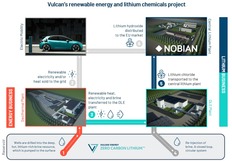- Nobian and Vulcan will assess producing lithium hydroxide from lithium chloride in Germany.
- A demo-plant in Frankfurt is planned to be operational by Q3 2022.
- The project aims to support Europe's growing EV battery market and sustainability goals.
- Vulcan's lithium production will use zero fossil fuels and aims for net zero carbon emissions.

Feasibility Study for Lithium Hydroxide Production
Nobian and Vulcan have signed an agreement to assess the feasibility of producing lithium hydroxide from lithium chloride in Germany. This initiative targets the fast-growing European battery and Electric Vehicles (EV) market.
Demo-Plant in Frankfurt
Nobian will leverage its expertise in electrolysis and chloride production to generate lithium hydroxide, hosting an electrolysis and crystallization demo-plant at its Frankfurt site. The demo-plant, operated by Vulcan in collaboration with Nobian, is expected to be operational by Q3 2022. The companies will also explore chlorine and hydrogen offtakes, by-products of the electrolysis process, and assess the feasibility of a commercial lithium plant.
Strategic Partnership
This partnership combines Nobian’s long-standing expertise in chloride electrolysis with Vulcan’s access to Europe’s largest lithium resource and sustainable lithium production methods. Vulcan has secured offtake agreements with major car manufacturers like Stellantis, Volkswagen, and Renault.
European Lithium Market
The agreement strengthens both companies' positions in the lithium market, supporting the EU’s ambition to reduce dependency on external sources for raw materials and technology. The project aligns with the EU's goals to establish European battery factories and locally source lithium.
Sustainable Production
Lithium chloride will be extracted from Vulcan’s geothermal brine using a Direct Lithium Extraction (DLE) process and converted to lithium hydroxide through electrolysis, using zero fossil fuels. Vulcan plans to build several geothermal plants, adjacent DLE plants, and a central Lithium Hydroxide plant in the Upper Rhine Valley area near Frankfurt.
Environmental Goals
The cooperation supports Nobian’s goal to become carbon neutral by 2040 and contributes to European and German climate goals to achieve climate neutrality by 2050, promoting electric and green mobility.

